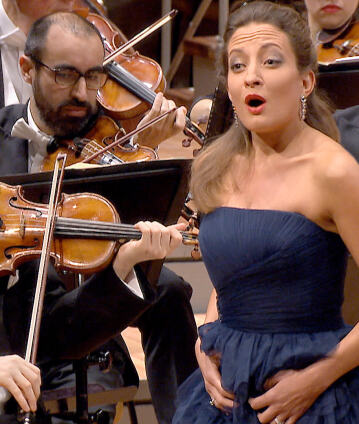Iván Fischer and Christiane Karg

Mozart’s qualities as a music dramatist also manifest themselves in his Prague Symphony, whose operatic contrasts conjure up the world of Don Giovanni and of Figaro time and again. In addition, conductor Iván Fischer presents selected Mozart arias with soprano Christiane Karg. This is preceded by a work by Béla Bartók as visionary as it is captivating: the innovatively instrumented Music for Strings, Percussion and Celesta.
It was Stanley Kubrick who helped Béla Bartók’s Music for Strings, Percussion and Celesta to widespread popularity: in 1980, the legendary American filmmaker set several scenes of his horror film The Shining, based on Steven King’s novel of the same name, to the beginning of the second movement of the composition Bartók had composed 44 years earlier – an idiosyncratic interpretation of this music, that, like the work’s other movements, bears witness to Bartók’s musical language, by the same token suggestive and compositionally precisely developed. Eight years before composing Music for Strings, Percussion and Celesta, Bartók admitted: “In my more recent works I use more counterpoint than I used to. In that way I avoid the formulas of the 19th century that were predominantly homophonic in nature. I study Mozart. Didn’t he combine contrapuntal and homophonic ideas in some of his slow movements in a wonderful way?”
It’s thus no wonder that Bartók’s compatriot Iván Fischer has also placed one of the most popular symphonies penned by Mozart on the programme. In Mozart’s 38th contribution to the genre according to the established reckoning, the so-called Prague Symphony, echoes of its composer’s operas can hardly be overheard. And thus it is only logical that vocal music can also be heard in this programme. Christiane Karg, whose technically flawlessly soprano voice is virtually predestined to bring Mozart’s music to life, can be experienced as the interpreter of several arias that Mozart composed for prima donnas who were celebrated in his day, or with which he helped other composers’ stage works to achieve success.
The programme kicks off with Prélude à l’unisson, the first movement of the Orchestral Suite No. 1 by George Enescu, the Rumanian composer who died in Paris in 1955. This rarely heard piece also fits in the overall picture: That’s because since Fischer took up his position as chief conductor of the Konzerthausorchester in August 2012, he has enriched Berlin’s musical life with countless exciting facets. His bridge building between Mozart and Bartók, between concertante and vocal music, between the familiar and new discoveries promises to be a similarly interesting evening.
© 2016 Berlin Phil Media GmbH
Related interviews
Artists
Our recommendations
- 2020 Europakonzert from the Philharmonie Berlin with Kirill Petrenko
- Yannick Nézet-Séguin conducts Mahler and Reinicke
- Christian Thielemann conducts a concert “à la française”
- Emmanuelle Haïm conducts Handel’s “La resurrezione”
- An “Austro-Hungarian Evening” with Iván Fischer
- Iván Fischer and Anna Vinnitskaya